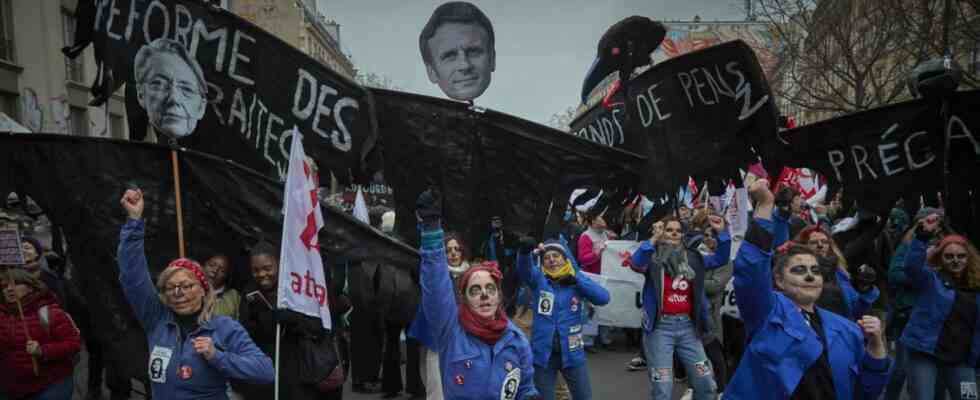The day before, the first trains were canceled at French train stations, and the BFM television broadcaster counted down the days until this “jeudi noir,” or “black Thursday.” It is the first major day of protests in France since the government unveiled its controversial plans to reform the pension system.
The trade unions and left-wing parties expect a lot from this day – especially since the hot autumn announced last year was rather lukewarm. Is France now in chaos? Are the yellow vests coming back? Does the government have to bury its reform plans? These are just some of the questions that have been asked over the past few days.
On the Place de la République, traditionally the starting point of social protests in Paris, everything looks normal when the strike begins. People with red union flags, demonstrators in safety vests, doctor’s coats, with fire brigade helmets. Posters with phrases like “Macron, get off your throne” and “Métro, boulot, caveau”, “Metro, work, grave” . Many shops have closed their window shutters. Merguez sausages are grilled at the roadside.
“I’m here to defend my rights,” says a firefighter who comes with colleagues from the Yvelines department. When the 50-year-old started working, he thought he could retire at 57. Now he will probably have to work until he is 62. Why does he find this unfair? “You can imagine what my work is like. We also work nights, we also work on the weekends. You can’t do that at 60.”
Pension reform is probably the most important and most sensitive project of President Emmanuel Macron’s second term. The plans presented by his government last week include raising the retirement age from 62 to 64, extending the contribution period to 43 years, and eliminating many privileges for certain professional groups.
This met with widespread resistance. Most opposition parties, from the far-right Rassemblement National to the far-left La France Insoumise, have announced they intend to vote against the bill in the National Assembly. For the first time in ten years, the eight largest unions have come together to call a joint strike.
They elected Macron to prevent Le Pen. Not for this reform
Maria, 64, wearing a red knitted hat and holding a red flag from the Force Ouvrière union, has been retired for two years. Nevertheless, she came to the capital to protest. Out of solidarity, she says. “I couldn’t and wouldn’t have worked until I was 64, my job as a teacher was far too strenuous for that.” She isn’t convinced by Macron’s argument that the reform was part of his election program and was therefore legitimate: “Many voted for Macron to prevent Marine Le Pen – not to get pension reform.”
It’s not as if the government hasn’t made concessions in its reform plans. During the election campaign, Emmanuel Macron had advocated raising the retirement age to 65. Now he and his government are content with 64 years. The plans still provide for exceptions for certain professional groups. Even those who started working very early should be allowed to retire earlier than 62. The government is also planning to increase the minimum pension to 1,200 euros.
He has already made concessions on what is probably the most important project of his second term. But they are not enough for many: President Emmanuel Macron.
(Photo: Ludovic Marin/AFP)
“These are small bites that you throw at people now,” says David, 54. For more than 20 years he worked for the Paris transport company and sold underground metro tickets. He has been retired for a year. He has stretched a yellow warning vest around his backpack. He still sympathizes with the Yellow Vests movement, which messed up France in the fall of 2018. He doesn’t believe that the protests will come back in this form. “It escalated so much back then that more and more people turned their backs on us. The yellow vests are no longer really respected,” he says.
Believe that the strikes will thwart the government’s plans according to a survey by the Ifop Institute only a few French people. Two-thirds of those surveyed assume that Macron will push through his reform. The approval of the conservative Republicans in Parliament is not guaranteed, but likely. “What we achieve will be seen at the end of the day,” says the firefighter from Yvelines: “I hope we set an example.”
At the end of the day of the strike, the French authorities counted just over a million participants across the country. When Macron started his first attempt at reform in 2019, which he then postponed because of Corona, around 600,000 people demonstrated. In the coming days it will be decided whether the strikes will be extended and expanded. The CGT union has already announced new strikes for refineries and petrol depots for late January and early February. The extreme left-wing La France Insoumise and several youth organizations are already calling for a “march for our pensions” on Saturday.
President Emmanuel Macron, who traveled to Barcelona for a Spanish-French summit on Thursday, defended his reform there as “just and responsible”.

